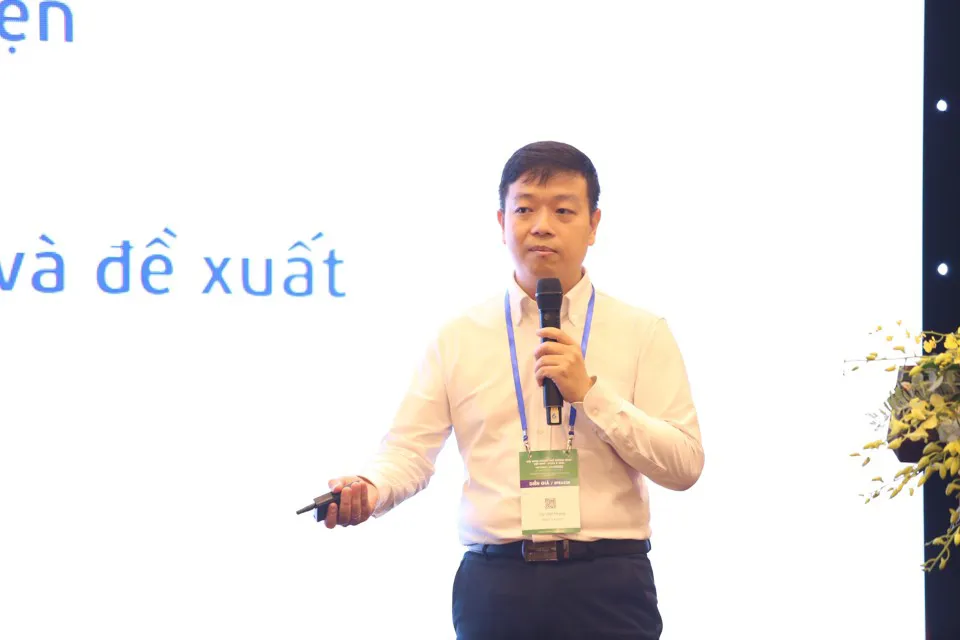Planning essential to promote smart city development
This involves the construction and development of infrastructure and urban architectural works in a smart manner, aligning with approved planning projects.
Smart city development should commence with meticulous urban planning, followed by the establishment of smart urban management, and ultimately, the provision of smart utility services.
| Urban expert Tran Ngoc Linh. Photos: Thanh Hai/The Hanoi Times |
Urban expert Tran Ngoc Linh from the Ministry of Construction (MoC) stressed the view during a thematic discussion session themed “Building smart cities – citizen, business-centric” today [November 29] at the Vietnam – Asia Smart City Summit 2023 in Hanoi.
Numerous localities and major cities, such as Hanoi, Ho Chi Minh City, Haiphong, Danang, and Quang Ninh, so far have taken the lead in initiating smart urban development programs and projects. They focus on key areas like education, health, transportation, public services, public administration, e-Government, and smart tourism.
Linh noted the MoC has been working with the Ministries of Information and Communications, Science and Technology, as well as other ministries and localities to implement research programs and plans for smart city development.
Currently, 48 out of 63 provinces and first-tier cities in the country are either implementing or planning smart city development projects, Linh said.
However, Linh said there have been minimal changes in nationwide smart urban construction investment projects from 2020 to date.
“The projects proposed in some provinces and first-tier cities are still in the early stages of approving investment policies, developing detailed project plans, or are in the research and development phase,” said Linh.
| Delegates at the session. |
Regarding the challenges in smart city development, Linh mentioned that most localities are still in the initial stages, focusing on the application of technology and utilities for smart cities. Challenges remain in implementing content related to smart planning, construction management, and development of smart urban areas due to limited resources and data.
Key difficulties include the lack of resources for smart urban development and the absence of effective association and connection between businesses and the private economy in this realm.
“This leads to separate and unsynchronized social resource mobilization. Additionally, connectivity and experience-sharing mechanisms among urban areas building smart cities are still underdeveloped,” he continued.
In analyzing the root cause, Linh pointed out the absence of specific policies supporting and encouraging smart urban development, especially in terms of capital mobilization and resource allocation. There is a lack of clear distinctions between items funded by the state budget and those by social and enterprise resources. The shortage of specialized management and professional staff with experience in planning, construction, and smart urban management is also a limiting factor.
Despite positive changes in social awareness of smart city development, Linh emphasized that this is still a relatively new issue not only for Vietnam but also globally. Therefore, more time is needed for research, learning, piloting, and application.
Looking ahead, he underscored that the initiation of smart urban development must commence with meticulous planning. This involves the construction and development of infrastructure and urban architectural works in a smart manner, aligning with approved planning projects.
“The realization of smart cities requires the active involvement from all levels and sectors,” said Linh.
| Vu Viet Hung from Viettel Business Solutions Corporation. |
Utilizing data to create new values
In discussing an effective digital transformation model with a focus on placing people and businesses at the core, Vu Viet Hung, a consulting expert at Viettel Business Solutions Corporation, emphasized the importance of data in this regard.
However, at present, some agency and unit managers lack awareness of the significance of digital transformation and have not taken clear and decisive actions.
The efficiency of online public services remains suboptimal compared to demand due to cumbersome administrative procedures. Public administrative services are still conducted directly at one-stop shops, meaning people can only access public services without visiting administrative offices.
Regarding the digital transformation goal for districts and digital government, Hung emphasized the need to enhance government management and administration while increasing interaction between the government and people.
Specifically, in terms of the digital economy, there is a need to boost non-cash payments and promote e-commerce for local economic development and the promotion of products and services. Concerning the digital society, ensuring telecommunications infrastructure and IT equipment, and equipping people and civil servants with digital skills are crucial to improving lives and social security, he said.
Proposing solutions, Hung suggested the introduction of virtual assistants to help people search for information, fill out forms, and receive notifications about processing results, to address challenges in accessing information about public services or dealing with complex and time-consuming procedures that require multiple declarations of personal information.
Furthermore, he recommended the development of a mobile application for submitting requests, digitally signing applications online, and utilizing official government websites to save time and enhance user experiences.
In particular, districts can address issues related to site clearance and handle people's complaints through a field reporting system. This helps overcome challenges in project management and monitoring within the district while enhancing transparency in land-use rights certificate issuance and planning.
Hung also advocated for a people-centric approach to digital transformation: identifying people's needs, building solutions based on those needs, ensuring information and personal information security during implementation, and continuously listening and improving to enhance people's satisfaction and trust.

.jpg)
.jpg)










